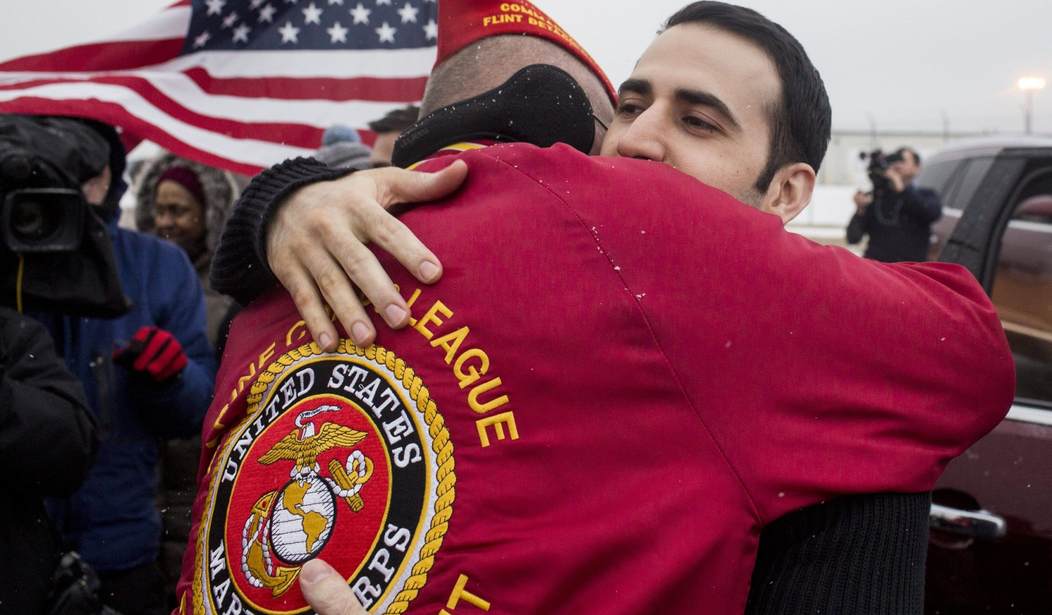WASHINGTON — A Marine veteran who was held for more than four years by the regime on trumped-up espionage charges is suing the Islamic Republic of Iran for the torture he received in the notorious Evin prison.
Amir Hekmati of Flint, Mich., was one of the U.S. prisoners released in the post-nuclear deal hostage swap this January. The Iraq war vet was visiting extended family in Tehran for the first time in August 2011 when he was seized.
Hekmati is represented by Scott Gilbert, a D.C. insurance and bankruptcy attorney who represented Alan Gross, a U.S. government contractor held for five years by Cuba.
The complaint filed Monday in U.S. District Court in the District of Columbia notes that Hekmati was taken to the “notoriously brutal” Evin prison right after his arrest and placed in solitary confinement for 17 months in a 1.5-meter by 1-meter cell.
“During those months, and during the entirety of his four and a half years in captivity, Mr. Hekmati suffered prolonged and continuous physical abuse at the hands of the Iranian Ministry of Intelligence. The torture that Mr. Hekmati endured included being whipped at the bottom of his feet, struck by an electrical Taser to his kidney area, forced to stay in stress positions for hours at a time, and hit with batons,” the document states.
“Prison guards threw water on his cell floor to prevent him from sleeping. A very bright light was kept on 24 hours a day to invoke sensory deprivation. Mr. Hekmati’s captors would force him to take lithium and other addictive pills and then stop giving him the pills to invoke withdrawal symptoms. He was denied proper medical care and suffered severe malnutrition.”
Hekmati “suffered extreme and continuous psychological torture” while having “virtually no human contact” over those first 17 months. He was only allowed to leave his cell to take a shower in freezing water for 20 minutes every 3 days.
“He was interrogated regularly. Intelligence officials repeatedly insulted Mr. Hekmati’s mother and family and his country. He was taunted for serving honorably as a U.S. Marine. At one point, he was told that his sister had been involved in a terrible car accident, but that he could not use the phone to call his family unless he confessed that he was a spy for the Central Intelligence Agency,” the complaint continues.
Hekmati, now 32 years old, was denied access to the U.S. Interests Section in Iran in violation of the Vienna Convention and was not charged for the first five months of his captivity.
“Mr. Hekmati was told that all of these abuses would continue for as long as it took unless and until he confessed to being a spy. After months of trauma, in December 2011, Mr. Hekmati’s abusers shifted their tactics. They transported Mr. Hekmati from Evin Prison to Esteghlal Hotel, dressed him in civilian clothes, gave him food and cigarettes, and told him he would be released immediately if he agreed to be interviewed for an internal training video for the Iranian Intelligence Ministry,” the document states.
“As part of the interview, Mr. Hekmati’s captors demanded that he state that he worked for the CIA. Mr. Hekmati initially refused. His interrogators told him he would be returned to solitary confinement if he did not comply. Mr. Hekmati, having suffered months of physical and psychological abuse, ultimately complied in hopes of being released and reunited with his family, as his abusers had promised. Iran did not release Mr. Hekmati, but rather broadcast the ‘confession’ on Iranian state television as ‘proof’ of Mr. Hekmati’s crimes and then returned him to solitary confinement.”
He was then given a 15-minute closed-door trial for which he was allowed to meet with a court-appointed attorney just five minutes before proceedings began. After being convicted of espionage, “waging war against God, and corrupting the earth,” he was given the first death sentence levied on an American since the Islamic Revolution. That was later commuted to 10 years in prison for collusion with the U.S. government.
After his time in solitary, Iranian officials moved him to a new ward that was “even more brutal” in terms of criminals occupying the prison block and the rank conditions.
“His cell was infested with rats, which he had to kill himself using a broomstick. His skin was eaten by lice, fleas, and bed bugs. He suffered from recurring lung infections and constant stomach problems due to malnutrition.” This was on top of continued abuse from regime officials.
The lawsuit notes that the administration’s swap that released Hekmati and four other imprisoned Americans in exchange for clemency for seven Iranians indicted or imprisoned in the United States for sanctions violations “also resulted in the release of certain frozen Iranian assets in the United States.”
“Mr. Hekmati’s confinement caused him severe and extreme psychological distress, both during his imprisonment and after his release. Since returning home, Mr. Hekmati has suffered post-traumatic stress disorder and other lasting psychological damage from his captivity and torture.”
The court filing also notes that Hekmati, a government contractor who was about to begin studying economics at the University of Michigan when he was captured, “is also jobless and suffering the financial effects of being robbed of four and a half years of income and the master’s degree he had intended to obtain before his imprisonment.”‘
The lawsuit accuses Iran of injuries caused by torture and hostage taking, assault and battery, intentional infliction of emotional distress and false imprisonment.
“As a result of the personal injuries he has suffered due to acts of torture and hostage-taking, Mr. Hekmati is entitled to economic damages and compensatory damages for pain and suffering, all of which are recoverable under the [Foreign Sovereign Immunities Act],” the document concludes. “In addition to all appropriate compensatory damages, Mr. Hekmati is entitled to punitive damages because Iran’s acts were intentional, malicious, and performed deliberately to injure, damage, and harm Mr. Hekmati.”
On Tuesday, a summons was issued to the Iranian government: “A lawsuit has been filed against you… If you fail to respond, judgment by default may be entered against you for the relief demanded in the complaint. You also must file your answer or motion with the court.”
Questioned about the lawsuit on Tuesday, White House press secretary Josh Earnest said he hadn’t seen the documents.
“There was genuine concern that these Americans weren’t just being deprived of their ability to spend time with their families, but that they were doing, they were facing that deprivation in very hostile circumstances. And we are deeply concerned about the safety and health and well-being of the American citizens. That’s why we worked so hard to get them out,” Earnest insisted.
“…When I was talking about this earlier, I think I inaccurately described them as hostages. Our policy is that they were detainees. That they were unjustly detained by the Iranian government and we worked very diligently to secure their release because of our concern for their well-being and because of our concern about the conditions in which they were being held. So the president made this a personal priority to secure the release of these detainees.”









Join the conversation as a VIP Member